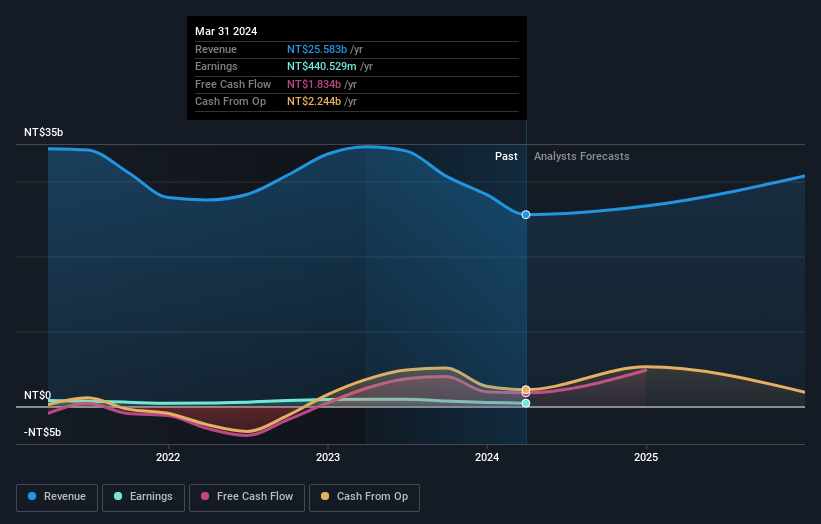Stock Analysis
- Taiwan
- /
- Communications
- /
- TWSE:3380
Alpha Networks Inc.'s (TWSE:3380) market cap dropped NT$1.8b last week; Public companies bore the brunt

Key Insights
- Significant control over Alpha Networks by public companies implies that the general public has more power to influence management and governance-related decisions
- Qisda Corporation owns 58% of the company
- Ownership research, combined with past performance data can help provide a good understanding of opportunities in a stock
Every investor in Alpha Networks Inc. (TWSE:3380) should be aware of the most powerful shareholder groups. The group holding the most number of shares in the company, around 62% to be precise, is public companies. In other words, the group stands to gain the most (or lose the most) from their investment into the company.
As market cap fell to NT$18b last week, public companies would have faced the highest losses than any other shareholder groups of the company.
In the chart below, we zoom in on the different ownership groups of Alpha Networks.
Check out our latest analysis for Alpha Networks

What Does The Institutional Ownership Tell Us About Alpha Networks?
Institutions typically measure themselves against a benchmark when reporting to their own investors, so they often become more enthusiastic about a stock once it's included in a major index. We would expect most companies to have some institutions on the register, especially if they are growing.
As you can see, institutional investors have a fair amount of stake in Alpha Networks. This implies the analysts working for those institutions have looked at the stock and they like it. But just like anyone else, they could be wrong. When multiple institutions own a stock, there's always a risk that they are in a 'crowded trade'. When such a trade goes wrong, multiple parties may compete to sell stock fast. This risk is higher in a company without a history of growth. You can see Alpha Networks' historic earnings and revenue below, but keep in mind there's always more to the story.

Hedge funds don't have many shares in Alpha Networks. Qisda Corporation is currently the largest shareholder, with 58% of shares outstanding. This essentially means that they have extensive influence, if not outright control, over the future of the corporation. In comparison, the second and third largest shareholders hold about 4.1% and 2.3% of the stock.
While it makes sense to study institutional ownership data for a company, it also makes sense to study analyst sentiments to know which way the wind is blowing. While there is some analyst coverage, the company is probably not widely covered. So it could gain more attention, down the track.
Insider Ownership Of Alpha Networks
The definition of company insiders can be subjective and does vary between jurisdictions. Our data reflects individual insiders, capturing board members at the very least. Company management run the business, but the CEO will answer to the board, even if he or she is a member of it.
Insider ownership is positive when it signals leadership are thinking like the true owners of the company. However, high insider ownership can also give immense power to a small group within the company. This can be negative in some circumstances.
We note our data does not show any board members holding shares, personally. It is unusual not to have at least some personal holdings by board members, so our data might be flawed. A good next step would be to check how much the CEO is paid.
General Public Ownership
The general public-- including retail investors -- own 29% stake in the company, and hence can't easily be ignored. While this group can't necessarily call the shots, it can certainly have a real influence on how the company is run.
Public Company Ownership
We can see that public companies hold 62% of the Alpha Networks shares on issue. This may be a strategic interest and the two companies may have related business interests. It could be that they have de-merged. This holding is probably worth investigating further.
Next Steps:
I find it very interesting to look at who exactly owns a company. But to truly gain insight, we need to consider other information, too. Case in point: We've spotted 2 warning signs for Alpha Networks you should be aware of.
If you would prefer discover what analysts are predicting in terms of future growth, do not miss this free report on analyst forecasts.
NB: Figures in this article are calculated using data from the last twelve months, which refer to the 12-month period ending on the last date of the month the financial statement is dated. This may not be consistent with full year annual report figures.
New: Manage All Your Stock Portfolios in One Place
We've created the ultimate portfolio companion for stock investors, and it's free.
• Connect an unlimited number of Portfolios and see your total in one currency
• Be alerted to new Warning Signs or Risks via email or mobile
• Track the Fair Value of your stocks
Have feedback on this article? Concerned about the content? Get in touch with us directly. Alternatively, email editorial-team (at) simplywallst.com.
This article by Simply Wall St is general in nature. We provide commentary based on historical data and analyst forecasts only using an unbiased methodology and our articles are not intended to be financial advice. It does not constitute a recommendation to buy or sell any stock, and does not take account of your objectives, or your financial situation. We aim to bring you long-term focused analysis driven by fundamental data. Note that our analysis may not factor in the latest price-sensitive company announcements or qualitative material. Simply Wall St has no position in any stocks mentioned.
Have feedback on this article? Concerned about the content? Get in touch with us directly. Alternatively, email editorial-team@simplywallst.com
About TWSE:3380
Alpha Networks
Engages in the research and development, design, production, and sale of broadband products, computer network systems, wireless local area networks, and related accessories in Taiwan, Singapore, China, the United States, and internationally.
Excellent balance sheet with questionable track record.

